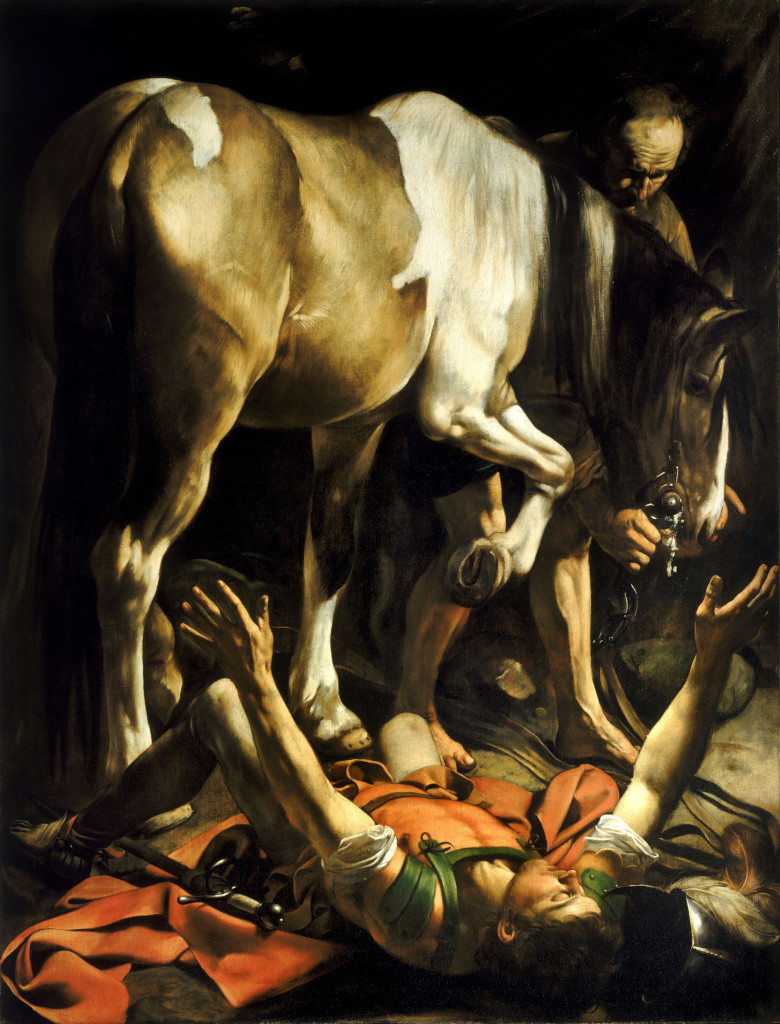 The poem "The Stupid Christ" has been a launching point for the previous two entries in this series, and like this entry, has been appropriated for segue to commentary on discussions by Marxists about religious faith. This discussion has specifically focused on what has been seen as the revolutionary message of St. Paul: on philosophical wagers on faith; not a theist faith, but an atheist faith. My investigations have been about Alain Badiou on this line in his very influential work St.Paul: The Foundation of Universalism. Articles by a number of writers offering critique and review of this book are being quoted in these blog entries, using excerpts, and then extrapolations from the mind of the poet.
The poem "The Stupid Christ" has been a launching point for the previous two entries in this series, and like this entry, has been appropriated for segue to commentary on discussions by Marxists about religious faith. This discussion has specifically focused on what has been seen as the revolutionary message of St. Paul: on philosophical wagers on faith; not a theist faith, but an atheist faith. My investigations have been about Alain Badiou on this line in his very influential work St.Paul: The Foundation of Universalism. Articles by a number of writers offering critique and review of this book are being quoted in these blog entries, using excerpts, and then extrapolations from the mind of the poet.So far this has been speculation on the nature of the Christ Event itself, but the purpose today is to double down on the wager. This is what the Marxists are doing I think. The Christ Event is taken as a paradigm of what Badiou terms the Event, the genesis of a Truth Procedure that is proposed as the the essence of revolutionary practice. This atheism is not a betrayal of Christ, it is an expansion of His meaning for the subjectivity of humanity. To begin, from Savoj Zizek in his In Defense of Lost Causes (Pg 176):
“The first thing we must do is to fully endorse the displacement in the history of Marxism concentrated in two great passages (or, rather, violent cuts) : the passage from Marx to Lenin, as well as the passage from Lenin to Mao . In each case, there is a displacement of the original constellation: from the most advanced country (as Marx expected) to a relatively backward country—the revolution ‘took place in the wrong country’; from workers to (poor) peasants as the main revolutionary agent. In the same way as Christ needed Paul's ‘ betrayal ‘ in order for Christianity to emerge as a universal Church (recall that, amongst the twelve apostles, Paul occupies the place of Judas the traitor, replacing him!), Marx needed Lenin's ‘ betrayal ‘ in order to enact the first Marxist revolution: it is an inner necessity of the ‘original’ teaching to submit to and survive this ‘betrayal’; to survive this violent act of being torn out of one's original context and thrown into a foreign landscape where it has to reinvent itself—only in this way is universality born.”
Orienting Badiou’s interpretation of the text of St. Paul to Marxist revolutionary practice I will simply provide excerpts from two articles that most explicitly undertake this review and critique of Badiou’s book.
The first article is by the writer John Steele published at the blog Kasama:
Alain Badiou: Another Take on Revolutionary Theory
“.. Badiou’s background is within Marxism and Maoism. international communist movement as it had emerged that far), has reached a point of 'saturation' as he terms it, and that a new beginning – a new truth-process, as he calls it – is necessary..
.. Alain Badiou has developed a distinctive philosophical system His view of ethics revolves around understanding how to have 'fidelity' to powerful breaks with conventional thinking, and militantly pursue those breaks as far as they can go – in theory and practice.. such a rupture or Event is the start of a process which changes both the world and the people involved in it, and creates and synthesizes new truths. The Event is the starting point for both a Truth-Process and a Subject, in Badiou’s terminology. (The Subject is not the particular person, but all who participate in the Truth-Process.)..
.. Badiou is examining Paul as an archetype of militancy – as a person with ‘Fidelity’ to a world historic ‘Event’ and the ‘Truth-Process’ emerging from it (in this case, a resurrection [undocumented to be sure] and a certain universal set of messages that were unprecedented for their times.)..
Badiou says he wants to trace the connection, embodied in Paul,‘between the general idea of a rupture, an overturning, and that of a thought-process which is this rupture’s subjective materiality.’
.. It’s the connection, in other words, between an Event and the Truth-Process and the Subject which are both born out of it. The ‘militant figure’ is the militant of a truth-process and part of a new subjectivity. (Subjectivity in this philosophical sense does not mean, as in Maoist usage, being un-objective or anti-scientific. It means in this case, being a new subject (or part of a new social subject), a newly defined and awakened actor on the social stage and within the new process of truth-formation.)..
.. What Paul contributed, Badiou believes, is the insight and practice of separating truths (and truth-processes) from their particular historical context. Badiou opposes this to the contemporary practices of dissolving truths into forms of cultural, linguistic or historical relativisms.
..‘Capital demands a permanent creation of subjective and territorial identities in order for its principle of movement to homogenize its space of action’..
.. A new truth-procedure, Badiou believes, will on the one hand interrupt and disrupt the repetition of the same which is the logic imposed by capital. On the other hand: although the eruption of new truth is a singular process,‘its singularity is immediately universalizable.’..
.. In other words: a truth-process originates in a particular event, breaking out at a particular time and place; but the process is one which brings into being new truths which are universal, or which can be universalized. So the truth-process also breaks with particular identities and relativist logic..
'What are the conditions for a universal singularity?’It is precisely on this question that he thinks it’s helpful to look at Paul, because this is his (Paul’s) question. The question, rephrased in Badiou’s terms, is this:
'What is the relation between the supposed universality of the postevental truth (that is, what is inferred from Christ’s resurrection) and the evental site, which is, indubitably, the nation bound together by the Old Testament?’
This becomes for Badiou a general question about the relation between the old and the new, after the occurrence of an event.. event is singular and unique: it breaks with the boundaries and categories of the situation out of which it erupts. But the event marks the beginning of a truth-process, which is a process of creating universal truths.. But Badiou also wants to stress what is something like the reverse process: how the truth which is essentially universal, traverses the differences and particularities of the world:
'With regard to the world in which truth proceeds, universality must expose itself to all differences and show, through the ordeal of their division, that they are capable of welcoming the truth that traverses them.’
This becomes one of Badiou’s chief themes in this book: the way in which new universal truths ‘traverse’ or travel through and incorporate the differences and particularities of the world.
'It is in fact the search for new differences,’ he says,‘New particularities to which the universal might be exposed, that leads Paul beyond the evental site properly speaking (the Jewish site) and encourages him to displace the experience historically, geographically, ontologically. Whence a highly characteristic militant tonality, combining the appropriation of particularities with the immutability of principles, the empirical existence of differences with the essential nonexistence, according to a succession of problems requiring resolution, rather than through an amorphous synthesis.’
Badiou then quotes Paul from Corinthians I (First Letter of Paul to the Corinthians, in the New Testament):
For though I am free from all men, I have made myself a slave to all, that I might win the more. To the Jews I became as a Jew, in order to win the Jews; to those under the law, I became as one under the law—though not being myself under the law—that I might win those under the law. To those outside the law I became as one outside the law—not being without law toward God but under the law of Christ—that I might win those outside the law. To the weak I became weak, that I might win the weak. I have become all things to all men.’ (Cor. I.9.19-22)
Badiou says: This is not an opportunist text, but an instance of what Chinese communists will call the mass line, pushed to its ultimate expression in serving the people. It consists in supposing that, whatever people’s opinions and customs, once gripped by a truth’s postevental work, their thought becomes capable of traversing and transcending those opinions and customs without having to give up the differences that allow them to recognize themselves in the world.’
.. a revolutionary militant or cadre. You have been grasped in your life and activated by a great eruption in the world.. have entered into a process of synthesizing and recognizing and establishing new truths in the world, a process which is not just yours, but yours along with many others.. the truth has to be made real in the world, not by opposing itself abstractly to the differences and particularities of people and groups, but through them. This would be what the mass line is about, as Badiou is interpreting it here.
'From the masses, to the masses’ – taking ‘the ideas of the masses’, synthesizing them through the universal truth in a way that does not dissolve their particularity, and bringing them ‘back to the masses’.”
Orienting Badiou’s interpretation of the text of St. Paul to Marxist revolutionary practice I am providing excerpts from two articles that most explicitly undertake this review and critique of Badiou’s book. The first was John Steele’s article above. The second is an article written by Roger Whitson in the online publication Politics and Culture:
Alain Badiou's St. Paul - St. Paul: The Foundation of Universalism
.. "Badiou's book forms a group with a number of critics, including Slavoj Zizek and Antonio Negri, who understand the use of religious language and religiosity in establishing a new type of revolutionary potential. For Badiou, Paul is not the father of Christianity as a metaphysical project. Rather, Paul is a revolutionary anti-philosopher of the event... Paul is a Christian insomuch as he participates in the Christ-event, insofar as he participates in the collective effort that politicizes the resurrection of Christ as something that can organize the multitude towards revolution. Baidou's book is a strange rethinking of collectivity.. a prophetic intratemporality that locates Paul as a contemporary figure currently helping us participate in resistance against oppression.. Badiou makes it clear early on that he cares little for the religious implications of his book..
.. 'Basically, I have never really connected Paul with religion. It is not according to this register, or to bear witness to any sort of faith, or even antifaith, that I have, for a long time, been interested in him’
For Badiou, the importance of Paul lies in how he makes us think about the event in general…
.. 'If today I wish to retrace in a few pages the singularity of this connection in Paul, it is probably because there is currently a widespread search for a new militant figure'..to use the past to produce a future against and ultimately beyond capital.. what Badiou would call a universal singularity with each believer participating in it.. believer forms a radical community that has no laws and is entirely subjective..
Towards metaphysics and capital, the truth procedure can only offer indifference… It is not as though Paul condemns Jewish Law, he just does not pay much attention to it. In this not-paying attention to, Badiou marks what could be the most potent revolutionary stance: an absolute exodus.. In-difference would not only mark a rejection of difference, but would also include a construction of being and the event focused around and inside of difference-in-itself. Difference would thus reject the static and standard identity networking of capitalism, and instead open itself up to fidelity as repetition, as a revolution that seeks a perpetuation of the event in its rejection of what Badiou calls the ‘automatism of desire'.. The static repetition of the law seeks an absolute harmony with earlier images of the event. This automatic repetition Baidou calls ‘sin'.. automatic desire can do nothing but prolong the reign of the law.. Autonomous desire is sinful, for Paul, not because it transgresses-but because its transgression is naïve, nostalgic, and impotent..
In-difference is needed for Badiou because it makes this non-contradictory difference possible in revolutionary thought. It is a non-dialectical movement that shatters any normalizing conception of difference as a networked reality under Jewish law. Fidelity to the event marks, thus, a constant moving away from the processes that would construct a singular truth or a singular law or even a singular difference. The event can only be called attention to in this moment of in-difference; and this in-difference, for Badiou, marks the only possibility for a revolutionary understanding of universalism..
The invocation of Paul by Badiou shows just how revolutionary this kind of thinking can be. Paul's image is already incorporated into an extremely complicated capitalistic apparatus, one that is becoming more and more global. Fundamentalisms--Jewish, Islamic, and Christian--all attempt to produce a radical alternative to global capital. By structuring their reaction so dialectially, though, fundamentalisms succeed only in reproducing the very structure they seek to disrupt… Love is the word Badiou uses to signify the opening of universalist revolutionary practice. This practice does not replace law with lawlessness, but sees itself beyond itself. The Law returns as a beyond of the law, the community returns as a beyond of the community, love returns time and time again--but beyond itself. Revolution, likewise, moves beyond itself in an act that serves to perpetuate what it is:
[T]he impetus of a truth, what makes it exist in the world, is identical to its universality, whose subjective form, under the Pauline name of love, consists in its tirelessly addressing itself to all the others, Greeks and Jews, men and women, free men and slaves’.. To be militant is to be universalist is to be a lover; it is to address oneself to all singularities in-differently. For it is within love, and it is here that we see yet a further affinity that Badiou might have with Che Guevarra and Paulo Freire, that the process of the truth event comes to be what it is: not in a static repetition, but in a absolutely dynamic mobility that revolutionizes itself in its perpetualizing existence.”
The Stupid Christ
when you felt forsaken
you knew us best..
it was after all then
you were a stupid christ
you were damned lucky son .
for that bit of the story
nailed that way . . .
complaining about it .
the guy next door knew more
you finally got it straight maybe
seeing him there .
hanging just like you .
dear sweet jesus .
you never left the cradle really
your ascension .
was barely an elevation
so when I used the mallet
saving an extra nail
pounding through . . .
both feet at once .
making sure to shatter
the joints in your wrists
to finish at last .
the manifest trinity .
not leaving one arm dangling
I was the worst of us
so my personal sorrow ended
thanks to you . . .
having finished .
what father wanted
completely . . .
for life eternal
for we the holy ghost
when you felt forsaken
you knew us best..
it was after all then
you were a stupid christ
you were damned lucky son .
for that bit of the story
nailed that way . . .
complaining about it .
the guy next door knew more
you finally got it straight maybe
seeing him there .
hanging just like you .
dear sweet jesus .
you never left the cradle really
your ascension .
was barely an elevation
so when I used the mallet
saving an extra nail
pounding through . . .
both feet at once .
making sure to shatter
the joints in your wrists
to finish at last .
the manifest trinity .
not leaving one arm dangling
I was the worst of us
so my personal sorrow ended
thanks to you . . .
having finished .
what father wanted
completely . . .
for life eternal
for we the holy ghost
Blog Guide: A discussion of blog features and primary topic content may be found at the initial entry. The first few entries give a good idea of how best to use the blog, especially for the tagging and social bookmarking at my external Delicious site, and for instructions regarding the Stefandav TV widget.
news books articles people topics culture politics philosophy activism badiou zizek
Subscribe to Stefandav: Atom 1.0 RSS 2.0
Read more!










